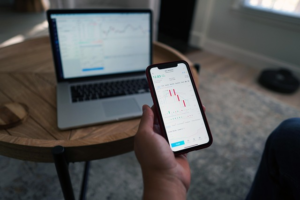Learn How To Trade Australia
Learn How To Trade Australia: Unlocking Economic Opportunities in the Sun-Down Under
Introduction
Welcome to an in-depth exploration of a dynamic and ever-evolving concept that is reshaping Australia’s economic landscape: Learn How To Trade Australia. In today’s interconnected global market, understanding the ins and outs of international trade is more crucial than ever for individuals and businesses alike. This comprehensive guide aims to equip readers with the knowledge and insights needed to navigate Australia’s unique trading environment and capitalize on its immense potential. By delving into various aspects, from historical context to future trends, we will uncover the keys to successful participation in Australia’s vibrant economic ecosystem.
Understanding Learn How To Trade Australia
Definition and Core Components
At its core, Learn How To Trade Australia refers to the process of acquiring knowledge, skills, and strategies to engage effectively in international trade within the Australian market. It involves understanding the complexities of exporting and importing goods and services, navigating regulatory frameworks, and harnessing the power of technology to optimize trading activities. The key components include:
- Market Research: Identifying potential markets, analyzing competitors, and understanding consumer behavior in Australia and overseas.
- Regulatory Compliance: Staying updated with Australian laws, customs regulations, and trade agreements to ensure legal and smooth trade operations.
- Logistics Management: Efficiently planning, executing, and overseeing the movement of goods, including transportation, warehousing, and supply chain management.
- Trade Financing: Accessing suitable financial instruments and understanding various payment methods to facilitate international transactions.
- Digital Trading Platforms: Utilizing online platforms and tools for trading, such as e-commerce sites, auction houses, and digital marketplaces.
Historical Context and Evolution
Australia’s trading history dates back centuries, shaped by its geographic position and rich natural resources. Traditionally, the country has been a significant exporter of agricultural products, minerals, and raw materials to global markets. Over time, Australia has evolved from a predominantly commodity-driven economy to a more diversified trading nation. This shift is evident in the increasing focus on services trade, including tourism, education, and financial sectors.
In recent decades, technological advancements have revolutionized the way Australia engages in international trade. The digital transformation has made it possible for businesses of all sizes to participate in global markets, fostering a more inclusive trading environment. Online platforms and e-commerce have levelled the playing field, allowing Australian entrepreneurs to reach customers worldwide. Furthermore, Australia’s strong commitment to free trade agreements (FTAs) has facilitated market access and encouraged foreign investment, thereby boosting its trading activities.
Global Impact and Trends
International Influence
Australia’s engagement in international trade has left a significant mark on the global economy. The country is known for its high-quality exports, robust legal framework, and commitment to fair trade practices. Australian commodities, such as coal, iron ore, and wheat, are sought after worldwide, contributing to the nation’s economic stability. Moreover, Australia’s progressive policies and favorable business environment have made it an attractive destination for multinational corporations looking to expand into Asia-Pacific markets.
Shaping Trading Trends
Several key trends are currently influencing Learn How To Trade Australia:
- Digitalization: The ongoing digital revolution continues to reshape trade, with more businesses adopting online platforms and e-commerce solutions. Mobile payment systems and blockchain technology are also gaining traction, enhancing transaction security and efficiency.
- Sustainable Trade: There is a growing emphasis on sustainable and ethical trading practices. Australian companies are increasingly incorporating environmental, social, and governance (ESG) criteria into their operations and supply chains to meet global demand for responsible products.
- Regional Integration: Australia’s proximity to rapidly growing Asian markets has led to increased regional integration. The country’s participation in regional trade blocs like the ASEAN Free Trade Area (AFTA) and the Regional Comprehensive Economic Partnership (RCEP) is strengthening economic ties within the Asia-Pacific region.
- E-Commerce Boom: The COVID-19 pandemic accelerated the shift towards online shopping, creating new opportunities for Australian businesses to expand their digital presence and tap into global e-commerce markets.
Regional Affects
Different regions within Australia experience unique impacts due to varying economic structures and trading partnerships:
- Eastern States: New South Wales (NSW) and Victoria are major economic hubs with strong manufacturing, service, and technology sectors. These states benefit from robust domestic and international trade links, including close ties to Asia.
- Western Australia: Known for its rich mineral resources, WA has historically relied heavily on commodity exports. However, the state is also diversifying its economy, focusing on agriculture, tourism, and renewable energy sectors to enhance its trading prospects.
- Northern Territories: NT’s remote location presents challenges but also opportunities in specialized industries like defense, mining, and tourism. Its strategic position makes it an important hub for trade between Australia and Asia.
Economic Considerations
Market Dynamics
Australia’s economy exhibits a mix of robust sectors and emerging trends:
- Agriculture: A key contributor to the country’s exports, Australia is renowned for its high-quality agricultural products, including wheat, wool, and livestock.
- Mining: The mining sector drives much of Australia’s commodity exports, with significant contributions from coal, iron ore, and gold.
- Services Sector: Services trade, particularly in financial services, education, tourism, and professional services, has been expanding, contributing to the country’s economic diversification.
- Tech and Innovation: Start-up culture and a supportive innovation ecosystem have fostered growth in technology and digital sectors, attracting global investments.
Investment Patterns
Australia’s investment climate is characterized by:
- Foreign Direct Investment (FDI): The country has been a popular destination for FDI, particularly from Asia, due to its stable economy, strong legal framework, and access to regional markets.
- Private Equity: Australia’s private equity sector plays a vital role in funding start-ups and supporting business growth through investments in various industries.
- Infrastructure Investments: The government encourages infrastructure development, attracting domestic and foreign investors to fund major projects, such as transport networks and renewable energy facilities.
Trade in Economic Systems
Learn How To Trade Australia is integral to the country’s economic systems, both domestically and internationally:
- Domestic Trade: Efficient internal trade facilitates the movement of goods and services across states, fostering a competitive market environment and ensuring supply chain resilience.
- International Trade: Exporting and importing activities contribute significantly to Australia’s GDP, create employment opportunities, and enable access to diverse products and resources not available domestically.
- Economic Growth: Trading partnerships drive economic growth by increasing productivity, encouraging innovation, and fostering competition, ultimately enhancing the overall standard of living for Australians.
Technological Advancements
Digital Transformation
Technology plays a pivotal role in shaping Learn How To Trade Australia:
- Online Marketplaces: E-commerce platforms like eBay, Amazon AU, and local marketplaces have revolutionized how Australian businesses sell products overseas. These platforms provide access to global customer bases and streamline order management.
- Digital Payment Systems: Mobile payment apps, digital wallets, and blockchain technology enhance transaction security and speed, making international payments more accessible and cost-effective.
- Supply Chain Management Software: Advanced supply chain management tools enable Australian businesses to track and optimize their logistics operations, improving efficiency and customer satisfaction.
- Data Analytics: Data analytics tools help traders make informed decisions by providing insights into market trends, consumer behavior, and competitive landscapes.
Future Potential
The future of technology in trading holds immense promise:
- Artificial Intelligence (AI) and Automation: AI can automate various tasks, from predictive analytics to automated trading algorithms, potentially increasing efficiency and profitability.
- Internet of Things (IoT): IoT devices can enhance supply chain visibility by tracking assets in real time, improving inventory management and logistics.
- 5G Technology: The rollout of 5G networks will enable faster, more reliable data transfer, benefiting online trading and digital communication.
- Blockchain for Trade Finance: Blockchain technology can streamline trade finance processes, reduce costs, and enhance transparency in international transactions.
Policy and Regulation
Key Policies and Frameworks
Australia’s government has implemented various policies and regulatory measures to support and guide Learn How To Trade Australia:
- Trade Agreements: The country has signed numerous FTAs, such as the Comprehensive and Progressive Agreement for Trans-Pacific Partnership (CPTPP) and the Japan-Australia Economic Partnership (JAEP), which reduce trade barriers and enhance market access.
- Australian Customs and Border Protection Service (ACBPS): The ACBPS oversees customs operations, ensures compliance with import/export regulations, and facilitates smooth trade flows.
- Trade Practice Act: This legislation sets out rules to promote fair trading practices, protect consumers, and ensure competition in Australia’s markets.
- Export Control Laws: Regulations like the Export Market Development Grants (EMDG) Program provide financial assistance and support for exporting businesses.
Regulatory Influence
These policies have a significant impact on trading activities:
- Facilitating Trade: Well-designed regulations simplify trade processes, reduce red tape, and encourage compliance, ultimately fostering a business-friendly environment.
- Protecting Consumers: Consumer protection laws ensure fair trading practices, maintaining market integrity and building consumer trust.
- Promoting Fair Competition: Anti-monopoly and competition policies prevent market dominance, encouraging healthy competition and innovation.
- Compliance and Enforcement: Stringent enforcement of trade regulations ensures that businesses adhere to standards, protecting both domestic and international markets.
Challenges and Criticisms
Overcoming Barriers
Despite its success, Learn How To Trade Australia faces several challenges:
- Logistical Complexity: Managing the logistics of international trade, including customs clearance, documentation, and transportation, can be complex and time-consuming, especially for small businesses.
- Regulatory Burdens: While regulations are essential, excessive red tape and changing compliance requirements can pose challenges for traders, particularly those operating across multiple jurisdictions.
- Market Volatility: Global market fluctuations, currency exchange rates, and geopolitical tensions impact Australia’s trading activities, requiring agile strategies to mitigate risks.
- Competition from Large Corporates: Established multinationals with extensive resources may dominate certain sectors, creating barriers for small and medium-sized enterprises (SMEs).
Proposed Solutions
Addressing these challenges requires a multi-faceted approach:
- Simplifying Regulations: Streamlining and digitizing trade regulations can reduce compliance burdens and enhance efficiency. Implementing self-service options for traders can further simplify processes.
- Improving Logistics Infrastructure: Investing in efficient logistics infrastructure, including ports, transportation networks, and warehousing facilities, can reduce costs and turnaround times.
- Education and Support for SMEs: Providing targeted training programs and resources for SMEs can empower them to navigate complex trading environments and compete effectively.
- Promoting Fair Competition: Enforcing anti-monopoly laws rigorously and fostering a level playing field will encourage healthy competition and innovation.
Case Studies: Successful Applications
Case Study 1: AgTech Innovation – “FarmTech”
Challenge: A young Australian start-up, FarmTech, aimed to revolutionize precision agriculture by developing advanced sensors and software for farmers. They sought to expand internationally but faced challenges in understanding global market dynamics and navigating complex import/export regulations.
Solution and Outcome: FarmTech partnered with an experienced trade consultant who guided them through the process of identifying target markets, adapting their products to local standards, and complying with regulatory requirements. With this support, they successfully entered several Asian markets, securing significant partnerships and funding opportunities. The company’s revenue grew exponentially within two years, establishing it as a global leader in AgTech.
Case Study 2: E-Commerce Retailer – “Aussie Style”
Scenario: Aussie Style, an online retailer specializing in Australian-designed fashion, wanted to tap into the US market but struggled with understanding consumer preferences and cultural nuances.
Strategy: They conducted extensive market research, focusing on consumer behavior and trends in the US. They also utilized social media platforms to build a brand presence and engage with potential customers. By adapting their marketing strategies to suit local tastes, Aussie Style experienced phenomenal growth, quickly becoming a go-to destination for Australian fashion in the US.
Case Study 3: Mining Equipment Supplier – “Mineral Tech”
Problem: Mineral Tech, a leading manufacturer of mining equipment, faced declining domestic demand and sought to expand internationally. However, they lacked expertise in navigating foreign markets and securing financing for their expansion plans.
Approach: The company partnered with an international trade agency that provided market entry strategies, identified potential partners, and facilitated access to export finance. With this support, Mineral Tech successfully established manufacturing facilities in several Asian countries, diversifying its customer base and increasing revenue streams.
Future Prospects
Growth Areas
The future of Learn How To Trade Australia holds immense promise across various sectors:
- Sustainable Energy: With a global push towards sustainability, Australia’s renewable energy sector is poised for growth, offering opportunities in solar, wind, and hydro technologies.
- Healthcare and Biotech: The country’s strong reputation for medical research and innovation presents significant export potential in pharmaceuticals, medical devices, and biotechnology.
- Education Services: Australian universities and educational institutions are globally renowned, attracting international students and providing online course platforms, all of which contribute to the education export sector.
- Financial Services: Australia’s robust financial sector can expand its reach through digital banking, fintech solutions, and investment management services.
Emerging Trends
Several emerging trends will shape the trading landscape:
- Green Trade: As sustainability becomes a priority, green trade initiatives and carbon credit schemes may open new avenues for Australian businesses to participate in global environmental projects.
- Digital Currency: The potential adoption of central bank digital currencies (CBDCs) could revolutionize cross-border payments and international trade financing.
- Regional Integration Deepens: With ongoing regional trade agreements, Australia’s trading partnerships are expected to strengthen, creating more opportunities for SMEs to access foreign markets.
- E-Commerce Continues to Grow: The online retail sector is set to expand further, driven by changing consumer behaviors and the increasing adoption of mobile technologies.
Strategic Considerations
To capitalize on these prospects, Australian businesses should:
- Stay Informed: Keep abreast of global trade trends, market shifts, and regulatory changes to adapt strategies accordingly.
- Embrace Technology: Invest in digital transformation to enhance operational efficiency, improve customer experience, and gain a competitive edge.
- Focus on Sustainability: Incorporate sustainable practices into business operations and explore opportunities in the green economy.
- Foster International Partnerships: Collaborating with foreign partners can open doors to new markets and provide access to valuable resources and expertise.
Conclusion
Learn How To Trade Australia is a dynamic and ever-evolving field that plays a pivotal role in shaping the country’s economic prosperity and global standing. Through embracing technology, navigating complex regulatory landscapes, and staying informed about market trends, Australian businesses can capitalize on numerous opportunities in international trade. As the world continues to become more interconnected, Australia’s ability to participate effectively in global trade will be key to its future success.
This comprehensive overview highlights the significance of Learn How To Trade Australia and serves as a guide for businesses seeking to navigate the complex yet rewarding world of international commerce.

Master Risk Management for Australian Markets: Build Wealth Within
Australia's dynamic market presents unique challenges for risk management, demanding global awareness and proactive strategies. Understanding commodity prices, regulatory shifts,…

Master Bull Market Trading Nationwide: Learn How to Thrive
The digital revolution has made learning how to trade accessible worldwide, breaking down geographical barriers with online platforms and educational…

Master Trading Psychology for Long-Term Success in Australia
Before trading, define risk tolerance and set realistic goals (income or wealth). Develop discipline with clear rules for entry/exit points…

Learn Algorithmic Trading: Australia’s Markets & Strategies
Explore Australia's financial markets, focusing on ASX and commodities, to gain an edge in algorithmic trading. Learn about local institutions,…

Master Finance: Australian Courses for Wealth Within
Australian educational courses provide a comprehensive path to building "wealth within" through interactive learning, covering market fundamentals, investment strategies, and…

Master Risk Management for Success in Aussie Markets: Learn How to Trade Volatility
Mastering the Australian market requires understanding key drivers and risk factors like interest rates, employment data, currency fluctuations, and seasonal…

Unlock Wealth Within: Aussie Timezone Trading Labs Mastery
Australian traders can leverage online trading labs tailored to their local time zone for elevated investment journeys. These platforms offer…

Master Order Execution: Learn How to Trade with Australian Experts
Aspiring traders can accelerate their learning curve and achieve success with personalized mentorship from Australian experts. These mentors refine order…

Explore Swing Trading: Wealth Within Australian Communities
Australia's diverse regions and financial hubs offer a fertile ground for swing traders seeking short-term gains. With access to top…

Master Futures Trading: Learn How to Trade Online with Australian Programs
Australian beginners and advanced traders have access to online programs teaching essential futures market skills, including risk management, technical analysis,…

Master Trading Psychology for Long-Term Success in Australia
Cultivating discipline and resilience is crucial for trading success in Australia's dynamic market. Managing emotions like fear and greed through…

Unlock Trading Secrets: Learn How to Master Australian Markets
Australia offers diverse educational platforms for learning how to trade, with online courses and workshops covering market fundamentals, risk management,…

Cultivate Trading Psychology for Wealth Within Australia
Trading psychology is vital for long-term success in financial markets. Australian traders must overcome mental barriers like fear and impatience…

Master Wealth Within: Australian Price Action Analysis Seminar
Master price action analysis through immersive Australian seminars to identify trends, reversals, and key levels, unlocking potential wealth within diverse…

Master Risk Management for Success in Aussie Markets: Learn How to Trade
The Australian market demands a sophisticated approach from investors learning how to trade successfully. Understanding key drivers like resource prices,…

Master Trading: Unlock Wealth in Nationwide Bull Markets
In a bull market, strategic investment techniques can unlock significant wealth. Access to online tools and platforms democratizes stock market…

Learn Position Sizing for Australian Risk Control: Trade Smart
Understanding risk tolerance and market volatility is crucial for successful trading. Position sizing techniques, like stop-loss orders, diversification, and dollar-cost…

Unleash Wealth: Master Commodity Trading in Australia
Australia's vibrant commodity trading scene offers vast "wealth within" through rich resource exports and global hub status. Advanced regulations, robust…

Master Trading Skills: Australia’s Live Simulations Guide
Australia's live market simulations offer a unique and safe way to learn how to trade, providing immersive sessions with real-time…

Mastering Newcastle Maitland Stocks: Weaving Wealth Within
Advanced stock strategies in Newcastle Maitland harness market potential through data-driven insights and innovative approaches to emerging industries. Diversification, risk…